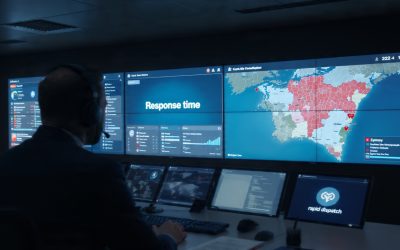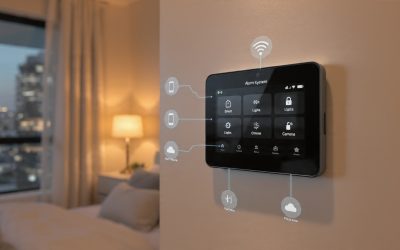A Comprehensive Guide
Closed-Circuit Television (CCTV) has become an integral part of modern security systems, providing a reliable means of surveillance for both residential and commercial properties. At its core, CCTV involves the use of video cameras to transmit signals to a specific set of monitors, allowing for real-time observation and recording of activities in designated areas. Unlike traditional broadcast television, which transmits signals publicly, CCTV operates on a closed network, ensuring that only authorized users can access the footage.
This fundamental difference makes CCTV an invaluable tool for enhancing security and monitoring environments. The technology behind CCTV has evolved significantly over the years. Early systems relied on analog cameras and tape recorders, which limited the quality and accessibility of footage.
Today, digital technology has transformed CCTV into a sophisticated surveillance solution. High-definition cameras, cloud storage, and remote access capabilities have made it easier than ever to monitor properties from virtually anywhere. Understanding these basics is crucial for anyone considering the implementation of a CCTV system, as it lays the groundwork for making informed decisions about security needs and options.
Key Takeaways
- Understanding the Basics of CCTV:
- CCTV stands for closed-circuit television and is a system of video cameras used for surveillance.
- It is commonly used for security and monitoring purposes in both public and private settings.
- Choosing the Right CCTV System for Your Needs:
- Consider factors such as the size of the area to be covered, lighting conditions, and whether the system will be used indoors or outdoors.
- Choose between analog and IP cameras, and consider features such as resolution, night vision, and remote access.
- Installing and Positioning Your CCTV Cameras:
- Proper installation and positioning of cameras is crucial for effective surveillance.
- Cameras should be placed strategically to cover vulnerable areas and minimize blind spots.
- Integrating CCTV with Other Security Systems:
- CCTV can be integrated with other security systems such as access control and alarm systems for a comprehensive security solution.
- Integration allows for centralized monitoring and control of all security measures.
- Maintaining and Monitoring Your CCTV System:
- Regular maintenance is essential to ensure that the CCTV system functions properly.
- Monitoring the system in real-time and reviewing footage when necessary is important for security and incident investigation.
Choosing the Right CCTV System for Your Needs
Selecting the appropriate CCTV system requires careful consideration of various factors, including the specific security requirements of your property, budget constraints, and desired features. One of the first steps in this process is to assess the areas that require surveillance. For instance, if you are looking to monitor entry points such as doors and windows, a system with high-resolution cameras and motion detection capabilities would be ideal.
Conversely, if you need to cover larger outdoor spaces, you may want to invest in PTZ (pan-tilt-zoom) cameras that can be remotely controlled to capture a wider field of view. Budget is another critical aspect when choosing a CCTV system. While it may be tempting to opt for the cheapest option available, it is essential to consider the long-term value and reliability of the equipment.
Investing in higher-quality cameras and recording devices can lead to better image clarity and durability, ultimately saving you money on repairs or replacements in the future. Additionally, consider whether you want a wired or wireless system; each has its advantages and disadvantages in terms of installation complexity and flexibility.
Installing and Positioning Your CCTV Cameras
Proper installation and positioning of CCTV cameras are vital for maximizing their effectiveness. The placement of cameras should be strategic, ensuring that they cover all critical areas without leaving blind spots. For instance, cameras should be installed at entry points such as doors and windows, as well as in high-traffic areas where unauthorized access is more likely.
It is also important to consider the height at which cameras are mounted; positioning them too high may limit their ability to capture clear facial images, while placing them too low could make them vulnerable to tampering. In addition to physical placement, the angle of the cameras plays a significant role in their effectiveness. Cameras should be angled to capture the most relevant activity while minimizing obstructions from trees, buildings, or other structures.
Furthermore, consider environmental factors such as lighting conditions; infrared cameras may be necessary for areas with low light levels. Taking the time to carefully plan the installation and positioning of your CCTV cameras can significantly enhance your overall security strategy.
Integrating CCTV with Other Security Systems
| Security System | Integration Benefits |
|---|---|
| Access Control | Enhanced monitoring of entry and exit points |
| Intrusion Detection | Improved verification of security breaches |
| Fire Alarm | Quick identification of fire incidents |
| Video Analytics | Advanced detection and analysis of video data |
To create a comprehensive security solution, integrating your CCTV system with other security measures is essential. This can include alarm systems, access control systems, and even smart home technology. By combining these systems, you can create a more robust security network that provides enhanced protection against potential threats.
For example, integrating your CCTV with an alarm system allows for real-time alerts when suspicious activity is detected, enabling a quicker response from security personnel or law enforcement. Moreover, modern technology has made it easier than ever to integrate various security systems into a single platform. Many manufacturers offer software solutions that allow users to monitor their CCTV feeds alongside other security features from a single interface.
This not only simplifies management but also enhances situational awareness by providing a holistic view of your property’s security status. As you consider your security needs, think about how different systems can work together to provide a more effective solution.
Maintaining and Monitoring Your CCTV System
Regular maintenance and monitoring are crucial for ensuring that your CCTV system operates effectively over time. Routine checks should include inspecting camera lenses for dirt or obstructions, testing recording devices for functionality, and ensuring that all connections are secure. Additionally, it is important to regularly update any software associated with your CCTV system to protect against vulnerabilities and ensure optimal performance.
Monitoring your CCTV footage is equally important. Depending on your setup, this may involve reviewing recorded footage periodically or utilizing motion detection features that alert you to unusual activity in real-time. Many modern systems offer cloud storage options that allow for easy access to footage from anywhere with an internet connection.
By staying vigilant and proactive in maintaining and monitoring your CCTV system, you can ensure that it continues to serve its purpose effectively.
Legal and Ethical Considerations of Using CCTV

Legal Considerations
Privacy concerns are at the forefront of these discussions; individuals have a right to privacy in certain spaces, and installing cameras in areas where people expect privacy—such as bathrooms or changing rooms—can lead to legal repercussions. It is essential to familiarize yourself with local laws regarding surveillance and ensure that your use of CCTV complies with regulations.
Ethical Implications
In addition to legal considerations, ethical implications should also be taken into account. Transparency is key; informing employees or visitors about the presence of surveillance cameras can help foster trust and mitigate concerns about being monitored. Furthermore, it is important to establish clear policies regarding how footage will be used and who will have access to it.
Striking a Balance
By addressing these legal and ethical considerations upfront, you can implement a CCTV system that respects individual rights while enhancing security.
Advancements in CCTV Technology
The field of CCTV technology is constantly evolving, with new advancements emerging regularly that enhance functionality and usability. One significant trend is the shift towards high-definition (HD) and ultra-high-definition (UHD) cameras that provide clearer images and greater detail than ever before. This improvement in image quality allows for better identification of individuals and activities captured on camera.
Another notable advancement is the integration of artificial intelligence (AI) into CCTV systems. AI-powered cameras can analyze footage in real-time, identifying patterns or unusual behavior that may indicate a security threat. This capability not only enhances monitoring efficiency but also reduces the burden on human operators who would otherwise need to review hours of footage manually.
As technology continues to advance, staying informed about these developments can help you make informed decisions about upgrading your CCTV system.
Case Studies: How CCTV Enhances Security in Different Settings
CCTV systems have proven their effectiveness across various settings, from residential homes to large commercial enterprises. For instance, in residential neighborhoods, homeowners have reported significant reductions in crime rates after installing CCTV cameras. The mere presence of surveillance equipment often acts as a deterrent for potential criminals who are aware they are being monitored.
In commercial settings, businesses have utilized CCTV not only for theft prevention but also for monitoring employee productivity and ensuring compliance with safety regulations. A case study involving a retail store revealed that after implementing a comprehensive CCTV system, incidents of shoplifting decreased by over 30%. Additionally, management was able to identify areas within the store that required better customer service training based on observed interactions captured on camera.
In conclusion, understanding the fundamentals of CCTV systems is essential for anyone looking to enhance their security measures effectively. By choosing the right system tailored to specific needs, ensuring proper installation and integration with other security measures, maintaining vigilance through regular monitoring, and considering legal implications, individuals can create a robust security framework that protects their property while respecting privacy rights. As technology continues to advance, staying informed about new developments will further empower users to leverage CCTV systems effectively in various settings.
Get In Touch
FAQs
What is CCTV?
CCTV stands for Closed Circuit Television. It is a system of video cameras that transmit signals to a specific set of monitors for surveillance and security purposes.
How does CCTV work?
CCTV cameras capture video footage and transmit it to a monitor or recording device. The footage can be viewed in real-time or stored for later viewing.
What are the benefits of using CCTV?
CCTV systems can help deter crime, provide evidence in legal matters, monitor and improve safety in public spaces, and enhance security in both residential and commercial settings.
Where are CCTV systems commonly used?
CCTV systems are commonly used in public areas such as airports, train stations, banks, and shopping centers, as well as in private settings such as homes, offices, and industrial facilities.
Are there any privacy concerns with CCTV?
Yes, there are privacy concerns with CCTV as it involves the monitoring and recording of individuals’ activities. It is important for CCTV operators to comply with privacy laws and regulations to protect individuals’ rights.
What are the different types of CCTV cameras?
There are various types of CCTV cameras, including dome cameras, bullet cameras, PTZ (pan-tilt-zoom) cameras, and covert cameras, each with specific features and applications.
Can CCTV footage be used as evidence in court?
Yes, CCTV footage can be used as evidence in court to support legal cases, such as criminal investigations, personal injury claims, and property disputes.











